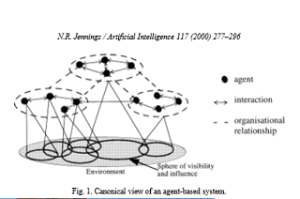
Autonomous and Intelligent Systems
Autonomy linked to the area of Artificial Intelligence (AI) has been changing its connotation over time, and today we can say that it is linked to the generic idea of interaction with information and social environments, which of course is a little too vague.
its connotation over time, and today we can say that it is linked to the generic idea of interaction with information and social environments, which of course is a little too vague.
So creating relationships between the field of Intelligent Agents and Complexity development, matters that have a very consistent formalization is Agent-based compueter is a good idea, and makes the concept less abstract.
According to Nicholas Jenning (2000), intelligent agents-based computer: “ represents an exciting new synthesis both for Artificial Intelligence (AI) and, more generally, Computer Science. It has the potential to significantly improve the theory and the practice of modeling, designing, and implementing computer systems. Yet, to date, there has been little systematic analysis of what makes the agent-based approach such an appealing and powerful computational model. Moreover, even less effort has been devoted to discussing the inherent disadvantages that stem from adopting an agent-oriented view. Here both sets of issues are explored.
A very important point, and little explored yet, but cited by Jenning is the question of social interaction, says the author: “The standpoint of this analysis is the role of agent-based software in solving complex, real-world problems. In particular, it will be argued that the development of robust and scalable software systems requires autonomous agents that can complete their objectives while situated in a dynamic and uncertain environment, that can engage in rich, high-level social interactions, and that can operate within flexible organisational structures”.
A field that is not well explored is whether robots and intelligent systems that have effective social interaction can be “aware” of this interaction, in the phenomenological sense, which says that it is consciousness of “something” that its activity directed to certain objects.
This is our next question.
Jenning, Nicholas. On agent-based software engineering . . Artificial Intelligence 117, Science Direct (Elsevier licence), 2000.









